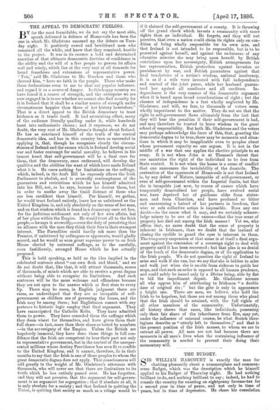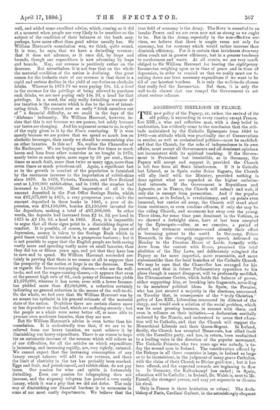THE BUDGET.
SIR WILLIAM HARCOURT is exactly the man for chatting pleasantly about a commonplace and common- sense Budget, which was the description which he himself applied to his Budget of Thursday night. He had nothing brilliant to do, and nothing brilliant to say ; indeed, he had to console the country for exacting an eightpenny Income-tax for a second year in time of peace, and not only in time of peace, but in time of depression. He chose his consolation well, and added some excellent advice, which, coming as it did at a moment when people are very likely to be sensitive on the subject of the condition of their balances at the bank, may, perhaps, have more effect than good advice usually has. Sir William Harcourt's consolation was, we think, quite sound. It is true, he says, that we have a dwindling revenue ; that it does not advance, as it once did, by leaps and bounds, though our expenditure is now advancing by leaps and bounds. Nay, our revenue is positively rather on the decrease. But nevertheless, it is not true that on the whole the material condition of the nation is declining. One great reason for the inelastic state of our revenue is that there is a rapid and serious decline in the yield of our duties on alcoholic drinks. Whereas in 1875-76 we were paying 19s. ld. a head to the revenue for the privilege of being allowed to purchase such drinks, we are now paying only 14s. 9d. a head for that privilege. In a word, the only really dwindling resource of our taxation is the resource which is due to the love of intoxi- cating drink. We cannot now so easily " drink ourselves out of " a financial difficulty, as we could in the days of the ' Alabama ' indemnity. Sir William Harcourt, however, in- sists that this is not because we are poorer, but solely because our tastes are changing. And his argument seems to us, in spite of the reply given to it by the Times, convincing. If it were merely because we are poorer that we spend so much less on alcoholic beverages, then surely we should be economising also on other luxuries. Is this so ? No, replies the Chancellor of the Exchequer. We are buying more than five times as much bacon and ham from other countries as we bought in 1870, nearly twice as much spice, more sugar by 50 per cent., three times as much fruit, more than twice as many eggs, more than seven times as much petroleum-oil. Again, a significant fact as to the growth in comfort of the population is furnished by the enormous increase in the importation of rabbit-skins since 1876. In 1876, Victoria, Tasmania, and New Zealand sent us 1,199,000 rabbit-skins, and in 1884 the number had increased to 14,766,000. Most impressive of all is the
amount deposited in the Post Office Savings Banks, which was £67,575,000 in 1875, a very prosperous year ; while the amount deposited in these banks in 1885, a year of de- pression, was £94,156,000, besides £3,150,000 invested for the depositors, making a total of £97,306,000. In other words, the deposits had increased from £2 Is. 3d. per head in 1875 to £2 13s. 6d. a head in 1885. Now, it is impossible to argue that all these signs point to a diminishing degree of comfort. It is possible, of course, to assert that in years of depression, money is taken to the Savings Bank which in good times would be invested in a prosperous business ; but it is not possible to argue that the English people are both saving vastly more and spending vastly more on small luxuries, than they did ten or fifteen years ago, and yet that they have less to save and to spend. Sir William Harcourt succeeded cer- tainly in proving that there is no reason at all to suppose that the prosperity of the nation at large is on the decrease. Even as regards the Income-tax-paying classes,—who are the well- to-do, and not the wages earning classes,—it appears that even at the present high rate of 8d., each penny of Income-tax yields £1,970,000, whereas it has never, even with a lower Income- tax yielded more than £2,016,000, a reduction certainly indicating no general reduction in the means of the well-to-do. On the whole, we feel sure that Sir William Harcourt was by no means too optimist in his general estimate of the material state of the nation. Doubtless there are certain classes more or less dependent on the land, which are suffering severely ; but the people as a whole were never better off, or more able to procure even moderate luxuries, than they are now.
But Sir William Harcourt's advice is even better than his consolation. It is undoubtedly true that, if we are to be relieved from our heavy taxation, we must achieve it by diminishing our heavy expenditure. There is no reason to hope for an automatic increase of the revenue which will relieve us of our difficulties, for all the articles on which expenditure is increasing, and increasing rapidly, are, very rightly, untaxed. We cannot expect that the increasing consumption of any luxury except tobacco will add to our revenue, and there the limit of elasticity in the tax has probably been reached. Eggs and fruit, and petroleum-oil, and rabbit-skins, do not pay taxes. Our passion for wine and spirits is fortunately dwindling. Even our passion for telegraphing does not increase, and the sixpenny telegram has proved a very costly luxury, which it was a pity that we did not defer. The only way of diminishing our financial burdens is to economise in some of our most costly departments. We believe that the true field of economy is the Army. The Navy is essential to an insular Power, and we are even now not as strong as we ought to be. But in the Army, especially in the non-effective ser- vices, we believe that there is ample room net only for economy, but for economy which would rather increase than diminish efficiency. For it is certain that lavishness does very often result not in greater efficiency, but in a greater tendency to carelessness and waste. At all events, we are very much• obliged to Sir William Harcourt for leaving the eightpenny Income-tax weighing upon us in time of peace and in time of depression, in order to remind us that we really must see to cutting down our least necessary expenditure if we want to be rid of our heaviest burdens. It is only the well-to-do classes. that really feel the Income-tax. But then, it is only the well. to-do classes that can compel the Government to set about serious reforms.



































 Previous page
Previous page